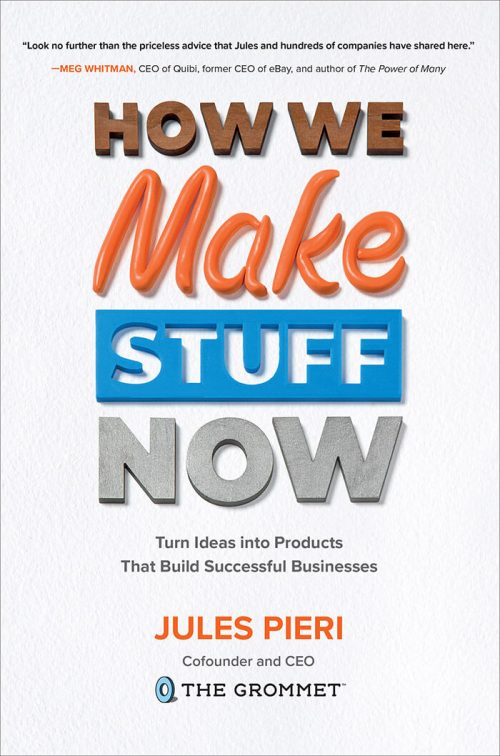Viewers often believe they learn what it takes to get a product off the ground by watching Shark Tank. One of the most obvious lessons of the popular show is the irresistible power of a founder’s swagger. An entrepreneur’s success does depend on an irrational belief in her vision as well as a honed skill in getting other people to believe. Swagger, especially in front of hot television lights, can look like a pretty good proxy for that.
What the “armchair entrepreneurs” don’t see on their screens is what it takes to develop that bravado. I have worked with thousands of consumer products entrepreneurs to launch their products on The Grommet. In fact, the producers of Shark Tank use our platform as a primary source for potential entrepreneurial guests. Knowing these founders before they show up on TV, I can attest that very few of them were born ready for a primetime broadcast, or even for their first private investor pitch. The esteemed godfather of entrepreneurial studies, Harvard Business School professor Howard Stevenson confirms, “The entrepreneurs I know are all different types. They’re as likely to be wallflowers as to be the wild man of Borneo.”
Entrepreneurs develop the needed chutzpah for much the same reason that a 110- pound woman will lift a car off of her trapped child if the situation arises. She has to.
The lengths founders will go to pursue their dreams consistently surprises “civilians.” For example Dan Wolff, the President of TickEase (a tick removal device) told me that he: “offered to have live ticks bite me and show how good my product works to remove them!”
For my book How We Make Stuff Now, I recently asked 125 Grommet founders “What’s the craziest thing you ever did to advance your business?” Some responses show the kooky stunts required to stand out in a very crowded business world:
- “It’s all crazy, but we once walked up and down the fairway at a large, nationally televised golf tournament, holding a Chippo Board above our heads–in hopes that it would get on TV. Instead, we got kicked out.” –Brendan McAuley, Co-Founder Chippo Outdoor Golf Game
- “I walked up to the president of Lifetime brands [a big housewares distributor] and dropped the Frego glass container in front of him to get his attention and to notice how unbreakable Frego products are! I ended up securing a meeting with the executives at their headquarters.” –Juhi Gupta, Founder and CEO of Frego food containers
- “I’ve pretended that I was the personal assistant to my partner in order to attract the attention of journalists.” –Cameron Chateauneuf, Co-founder of ErgoKiwi, ergonomic craft blade
- “My co-founder paid entry into a $1,500 poker tournament to be able to sit next to our future investor for a few hours. It worked — we secured our $500k seed round.” –Jeff Brayer, Director of Sales for Speaker Creatures, miniature waterproof speakers
- “Jumped on the desk of a buyer and started to dance and did not leave until he gave me the order. Long before computers, that was when buyers actually wrote paper there and then, and I was much younger and foolish.” –Aji Das, Founder of OGGI Hot and Cold Stainless Serving Bowls
While not everyone finds themselves leaping up on a table (though, I too have done that), founders are uniformly likely to find themselves making personal commitments and heroic efforts that they would have never contemplated in the context of a normal job:
- “At age 60, I invested my entire available cash.” –David B. Higgins, Founder and CEO of Foot Gym
- “After we aired on Shark Tank, I was SUPER excited about our sales, but noticed we had 2,000 abandoned checkouts [on our website.] Instead of sending the regular automated emails, I spent three days texting personal selfie videos to each customer by hand, and calling a ton of them. The response was amazing, and customers were so excited that they got a personal note from me. They also had my phone number so the next week when they had their orders, they would ask advice for better coffee or send me photos of their families using it. This is easily one of my proudest moments as an entrepreneur.” –Max Feber, college student and CEO of Mason Jar Cold BRUW Coffee Maker
- “I got 89 rejections before raising my $2M seed funding. I learned later that only 2% of women owned businesses received venture funding, and land less than 1% if you are a minority female. Lucky me, I’m both 🙂 But one thing I do have going for me is persistence!” –Sashee Chandran, CEO of TeaDrops
But the most surprising theme that emerged from these Makers is the degree of subterfuge these founders pursued in the interest of keeping their businesses afloat:
- “I had to reclaim my dies [critical manufacturing parts] through very unconventional means from a factory that was going to charge me three times what they had agreed to produce my product. Involved one getaway truck and car.” –Deborah Darnell, President of Social Lite, a decorative refillable lighter
- “I lie! It sounds worse than it is. I’ve realized a long time ago a potential customer finds it much harder to say NO to a meeting if you’re in town already. I therefore lie and tell them I’ll be in town these two days and I would really love fifteen minutes of their time. When I get the meeting I then book the trip and build around that.” –Daniel Yadgard, Magnaframe brand architect and inventor
- “When applying for a $92,000 grant with the SRA (the Social Rehabilitation Administration, formerly part of the National Institute of Health, now part of the U.S. Department of Education) to develop an artificial larynx, the granting agency insisted I have the space at my affiliated hospital to carry out the research before they would approve the grant. The affiliated hospital said the only way I could get the space was to have secured the grant. I then told the SRA grantors I got the space, upon which they gave me the grant and once having received the grant, I got the space and accomplished my goal in one year.” –Stanley Taub, serial entrepreneur and inventor of the iRoller
During the ten years of building The Grommet I can lay claim to many of my own acts of valor, subterfuge and exaggeration. I once snuck into the loading dock of an office high rise and then used the service elevators to drop off a gift for a talented person I wanted to recruit. And I have literally walked the shoes off my feet—my sturdy black wedge slip-ons disintegrated underneath me as I walked from one investor pitch to another.
A person meeting me (and seeing that I am soft spoken, calm but fierce, and steady—looking vaguely like a soccer mom) would probably assume I’ve led some kind of charmed entrepreneurial existence. But nothing could be further from the truth. The only truth is a founder will never let you see them sweat, even on Shark Tank.
Being an entrepreneur means your business is always the biggest thing in the room. In terms of other life experiences, its impact is very similar to the having your first child. It is truly equally upsetting as well as exhilarating. No one has a child because they relish the idea of dirty diapers, sleepless nights or massive financial responsibility. But they figure it out. As do entrepreneurs—because when you have a business, your decisions and actions are always serving a greater purpose. This focus makes it possible to walk through fear, shed the jitters, and discard squeamishness in taking difficult actions.
The above stories are a good reminder that sometimes we already do have what it takes—we just have to remind ourselves we can get the job done.
Find a Home-Based Business to Start-Up >>> Hundreds of Business Listings.


















































